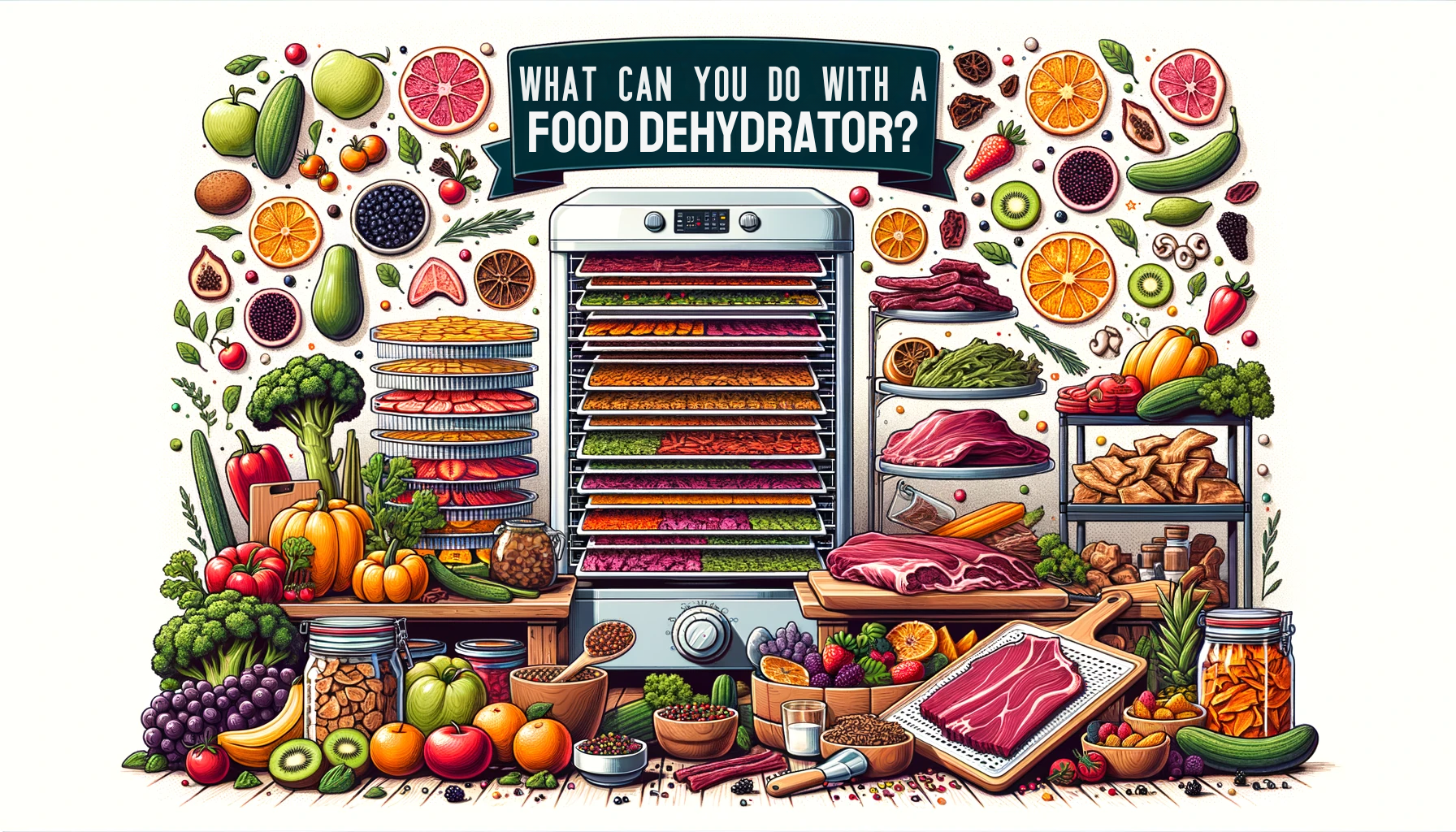If you’ve ever wondered about the health benefits of food dehydrators, you’re in for a treat. In this article, we’ll explore the topic of whether food dehydrators can contribute to a healthy lifestyle. From preserving essential nutrients to reducing food wastage, we’ll uncover the secrets behind this popular kitchen appliance. So, get ready to discover how food dehydrators can be a game-changer in your quest for a healthier way of eating.
What is a Food Dehydrator?
Definition
A food dehydrator is a kitchen appliance that removes moisture from food in order to preserve it. It works by circulating warm air over the food at a low temperature for an extended period of time. This process allows the food to dry out while retaining its nutritional value and flavor.
Function
The function of a food dehydrator is to gently remove the water content from food, which helps inhibit the growth of bacteria, yeast, and mold. By removing moisture, it prevents spoilage and extends the shelf life of various food items, including fruits, vegetables, meat, and herbs. Additionally, a food dehydrator helps to concentrate the flavors of the food, resulting in a more intense taste experience.
Benefits of Using a Food Dehydrator
Preservation of Nutrients
One of the major benefits of using a food dehydrator is that it helps preserve the nutrients in food. Unlike other cooking methods such as boiling or frying, which can cause a loss of vitamins and minerals, dehydration maintains the nutritional value of the food. With preserved nutrients, dehydrated fruits, vegetables, and meats can provide a convenient and healthy snacking option.
Longer Shelf Life
By removing moisture from food, a food dehydrator significantly extends its shelf life. Without moisture, bacteria, mold, and yeast have a difficult time thriving, which prevents spoilage. Dehydrated food can last for months or even years when stored properly, making it a great option for long-term food storage or for those who want to reduce food waste.
Reduced Waste
Food waste is a global issue, and using a food dehydrator can help reduce it significantly. When you dehydrate food, it can be stored for longer periods of time without spoiling, allowing you to use up fruits, vegetables, and herbs before they go bad. By reducing waste, you not only save money but also contribute to a more sustainable lifestyle.
Convenience and Portability
Dehydrated food is lightweight and compact, making it easy to transport and store. Whether you’re going on a hike, camping trip, or simply want a healthy snack on the go, dehydrated fruits, vegetables, and meats are a convenient option. They take up less space compared to fresh produce and are less likely to get squished or spoiled during transportation.
Potential Health Risks
Loss of Some Nutrients
While a food dehydrator helps preserve the majority of nutrients in food, it can lead to a loss of certain vitamins, such as vitamin C and some B vitamins. These nutrients are sensitive to heat and may be partially degraded during the dehydration process. However, the overall nutritional impact is minimal, and dehydrated food still retains a significant amount of its original vitamins and minerals.
Formation of Acrylamide
When some starchy foods are dehydrated, they can form a chemical compound called acrylamide. Acrylamide has been linked to health concerns, including potential carcinogenic effects. Foods commonly associated with high acrylamide levels include potatoes and grains. However, the levels of acrylamide in dehydrated foods are generally lower compared to fried or baked alternatives, reducing the potential health risk.
Higher Concentration of Sugar
Dehydrating fruits and other high-sugar foods can lead to a more concentrated sugar content. While natural sugars are still healthier than added sugars, it is important to consume dehydrated fruits and other high-sugar foods in moderation, especially for individuals with diabetes or those trying to manage their blood sugar levels. Regular consumption of high-sugar dehydrated foods may contribute to weight gain and other health issues.
Risk of Contamination
Improper food handling and storage practices during dehydration can increase the risk of food contamination. It is crucial to follow proper hygiene practices, such as washing fruits and vegetables thoroughly before dehydration, cleaning the dehydrator regularly, and storing the dehydrated food in airtight containers in a cool, dry place. By maintaining good hygiene, you can minimize the risk of bacterial growth and foodborne illnesses.
Impact on Digestion
Improved Digestive Health
The dehydration process helps break down complex carbohydrates in fruits and vegetables, making them easier to digest. This can be beneficial for individuals with sensitive digestive systems or those struggling with digestive issues such as bloating or gas. The easily digestible nature of dehydrated foods can contribute to improved overall digestive health, resulting in reduced discomfort and better nutrient absorption.
Maintaining Fiber Content
Fiber is an essential component of a healthy diet, promoting regular bowel movements and supporting gut health. While the dehydration process may reduce the water content in fruits and vegetables, it does not significantly affect the fiber content. Dehydrated fruits and vegetables still contain an adequate amount of dietary fiber, which aids in digestion and provides a feeling of fullness.
Effect on Blood Sugar Levels
Lower Glycemic Index
Dehydrated fruits generally have a lower glycemic index compared to their fresh counterparts. The glycemic index measures how quickly a particular food raises blood sugar levels. Foods with a lower glycemic index are digested and absorbed more slowly, resulting in a steadier release of glucose into the bloodstream. This can be beneficial for individuals with diabetes or those following a low-glycemic diet.
Suitability for Diabetics
Dehydrated fruits, with their lower glycemic index, can be a suitable option for individuals with diabetes who need to manage their blood sugar levels carefully. However, portion control is still important, as dehydrated fruits can still contribute to an increase in blood sugar levels if consumed in excessive amounts. It is always advisable to consult with a healthcare professional or a registered dietitian for personalized dietary recommendations.
Possible Negative Effects on Health
Alteration in Texture and Flavor
The dehydration process can alter the texture and flavor of certain foods. While some individuals enjoy the chewy and concentrated taste of dehydrated foods, others may find it less appealing. It is important to consider personal preferences when incorporating dehydrated foods into your diet to ensure overall enjoyment and satisfaction with your meals.
Development of Mold and Bacteria
If not properly dehydrated and stored, food can develop mold and bacteria. Moisture left in the food during the dehydration process or in the storage containers can lead to microbial growth. It is crucial to follow proper dehydration techniques, including ensuring the food is fully dry and storing it in airtight containers, to minimize the risk of mold and bacteria contamination.
Exposure to Preservatives
Some commercially available dehydrated foods may contain added preservatives to extend their shelf life. While these preservatives are generally considered safe, individuals with food sensitivities or those who prefer to consume natural and additive-free foods may want to opt for homemade dehydrated foods or carefully read ingredient labels before making a purchase.
Comparison with Other Cooking Methods
Retaining Nutrients
Compared to other cooking methods such as boiling, baking, or deep-frying, dehydration retains a higher amount of nutrients in the food. The gentle and low-temperature process helps preserve vitamins and minerals that may be lost during more intense cooking methods. Dehydrated foods can be a valuable addition to a balanced diet, providing a wide range of nutrients even after processing.
Reducing Fats and Oils
Dehydrating food does not require the addition of fats or oils, making it a healthier cooking alternative. Traditional frying or baking methods often involve the use of oils or fats, which can increase calorie content and add unhealthy fats to the food. By using a food dehydrator, you can enjoy the flavors and textures of your favorite foods without the added fats and oils.
Avoiding Harmful Chemicals
Some cooking methods, such as grilling or barbecuing, can lead to the production of harmful chemicals called polycyclic aromatic hydrocarbons (PAHs). These chemicals are created when meat, poultry, or fish juices come into direct contact with a flame. Dehydrating these foods eliminates the need for direct heat exposure, reducing the formation of PAHs and minimizing the potential health risks associated with them.
Minimizing Cooking Time
Dehydrating food typically requires a longer cooking time compared to other cooking methods. However, the hands-on preparation time is often minimal, as you mainly need to slice the food and place it in the dehydrator. Unlike other cooking methods that may require constant monitoring or stirring, dehydrating allows you to set it and forget it, giving you more time to focus on other tasks.
Best Foods to Dehydrate
Fruits
Fruits are a popular choice for dehydration, as they not only retain their nutritional value but also transform into delicious and portable snacks. Apples, bananas, mangoes, and strawberries are among the fruits that dehydrate well. You can enjoy them as is or use them to enhance granola, trail mix, or baked goods.
Vegetables
Dehydrated vegetables are a great way to preserve the nutritional content of fresh produce while also reducing waste. Common vegetables that can be dehydrated include tomatoes, bell peppers, carrots, and zucchini. These dehydrated vegetables can be used in soups, stews, and sauces, adding flavor and nutrients to your meals.
Meat and Poultry
Dehydrating meat and poultry can create protein-rich snacks that are perfect for on-the-go or as part of a charcuterie board. Beef jerky, turkey jerky, and chicken jerky are popular choices. It is important to ensure that the meat is cooked properly and dehydrated at the appropriate temperature to minimize the risk of bacterial growth.
Herbs and Spices
Dehydrating herbs and spices helps to intensify their flavors and prolong their shelf life. Basil, thyme, rosemary, and oregano are commonly dehydrated herbs that can be used in various culinary creations. Dehydrated chili peppers, garlic, and onion flakes can also be added to spice blends and marinades, enhancing the taste of your dishes.
Tips for Healthy Dehydration
Selecting Fresh and Ripe Produce
When dehydrating food, it is important to start with fresh and ripe produce. This ensures that you capture the most flavor and nutritional content in your dehydrated creations. Choose fruits and vegetables that are firm and free from bruises or blemishes for optimal results.
Proper Hygiene and Cleaning
Maintaining cleanliness and proper hygiene during the dehydration process is crucial to prevent the growth of bacteria or mold. Thoroughly wash fruits and vegetables before slicing and dehydrating them. Clean the dehydrator trays, racks, and other components with hot, soapy water after each use to prevent cross-contamination and maintain food safety.
Choosing Low-Sodium and Organic Options
If you are concerned about sodium intake, opt for low-sodium or no-salt-added options when dehydrating food. This allows you to have more control over the salt content in your dehydrated snacks. Additionally, choosing organic fruits, vegetables, and meats can minimize exposure to potentially harmful pesticides and hormones.
Avoiding Over-Dehydration
It is important not to over-dehydrate your food, as it can result in a loss of flavor, texture, and nutritional value. Pay attention to the recommended dehydration times and temperatures for different types of food. Start checking for doneness towards the end of the estimated dehydration time to prevent your food from becoming overly dry and brittle.
Conclusion
Food dehydrators offer a convenient and healthy way to preserve various types of food while maintaining their nutritional value. By removing moisture, food dehydrators extend the shelf life of fruits, vegetables, meat, and herbs, reducing waste and providing portable snack options. While there are potential health risks, such as the loss of some nutrients and the formation of acrylamide, overall, using a food dehydrator can positively impact digestion and blood sugar levels. It is important to consider personal preferences, follow proper dehydration techniques, and select a variety of foods for a well-rounded and nutritious diet. With a food dehydrator, you can enjoy homemade, flavorful, and nutritious snacks that contribute to a healthier lifestyle.


